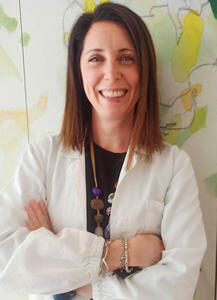Gruppo guidato da Stefania Raimondo (facente funzioni di Stefano Geuna, Rettore UniTo)


Giulia Ronchi
Contacts:
Tel +39 011 670 5435
Fax +39 011 9038 639
e-mail: giulia.ronchi@unito.it
Curriculum Vitae
City and date of birth: Vimercate (MI), 27/11/1982
Citizenship: Italian
Professional
From Dec 2021: Associate Professor Department of Clinical and Biological Sciences (University of Torino, Italy)
Jul 2017 - Dec 2021: Assistant Professor, Department of Clinical and Biological Sciences (University of Torino, Italy)
Jan 2013 - Jul 2017: Post-doctoral fellowship recipient (University of Torino, Italy)
January 2009 – December 2012: PhD student in Neuroscience at the University of Turin. Thesis entitled “Experimental study of post‐traumatic peripheral nerve repair”.
Jun 2006-December 2008: fellowship recipient at the University of Turin working on a project focused on different aspects of the peripheral nerve regeneration (microsurgical repair outcome of peripheral nerve related with age and physical exercise, effects of Neuregulin 1 in the peripheral nerve regeneration)
October 2007: Master degree in Neurobiology achieved at the University of Turin (title of Thesis: “Experimental study of the peripheral nerve surgical reconstruction”).
July 2005: Bachelor of Biology. University of Milano-Bicocca (title of the Thesis: “Nicotinic receptors in the Central Nervous system”).
Teaching Activities
From 2017 - present: Professor of Human Anatomy (Master's Degree in Medicine and Surgery and Bachelor’s degree in Nursing, University of Torino, Italy)
2017-2018: Professor of Human Anatomy (Bachelor’s degree in Rehabilitation Sciences, University of Torino, Italy)
2013-2017: Contract Professor of Human Anatomy (Bachelor’s degree in Motor Sciences, University of Torino, Italy)
2007-2013: Teaching Assistant of Anatomy at the Nursing School, University of Turin.
Technical Competences
Light, laser confocal and electron microscopy.
Immunohistochemistry and Western blot.
RT-PCR and quantitative Real Time PCR
Cell and tissue (DRG explants) culture.
Surgical procedures to induce peripheral nerve damages.
Stereological and morpho-quantitative analysis
Functional tests for motor recovery (grasping test)






